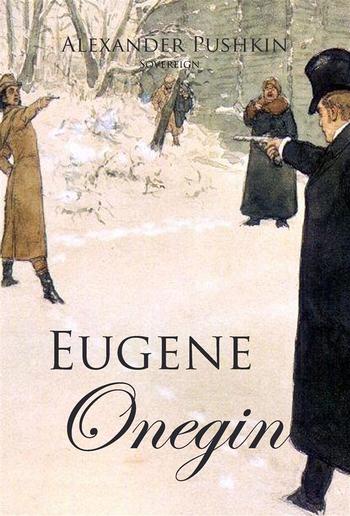The source of the book
This book is published for the public benefit under a Creative Commons license, or with the permission of the author or publisher. If you have any objections to its publication, please contact us.

Eugene Onegin Book PDF
(0)
Author:
Alexander PushkinNumber Of Downloads:
104
Number Of Reads:
279
Language:
English
File Size:
1.54 MB
Category:
literatureSection:
Pages:
170
Quality:
excellent
Views:
2689
Quate
Review
Save
Share
Book Description
Eugene Onegin by Alexander Pushkin is a landmark work of world literature and a defining achievement of Russian culture. Written as a “novel in verse,” this timeless classic blends poetry and storytelling to create a rich, ironic, and emotionally nuanced portrait of society, love, and personal disillusionment. Since its completion in the early nineteenth century, the book has profoundly influenced both Russian prose and poetry.
The story follows Eugene Onegin, a sophisticated young aristocrat from Saint Petersburg whose boredom with social life and emotional detachment shape his relationships and fate. Through his encounters with the sincere and idealistic Tatyana, the passionate poet Lensky, and the contrasting rhythms of city and countryside life, Pushkin explores themes of unfulfilled love, missed opportunities, and the consequences of pride and indifference. Onegin’s journey reflects the inner conflicts of a generation caught between romantic ideals and social convention.
Strongly influenced by Lord Byron, Pushkin reveals his characters through sharp wit, vivid descriptions of nature, and subtle psychological insight. The narrative unfolds in elegant sonnet-length stanzas known as the “Onegin stanza,” a distinctive poetic form that became one of Pushkin’s lasting innovations. This structure allows for shifts in tone that are at once humorous, reflective, and deeply serious.
Often described as both a love story and a social commentary, Eugene Onegin offers readers a compelling exploration of human character and moral choice. With scholarly introductions, explanatory notes, and critical essays included in many editions, the novel remains accessible and rewarding for modern readers, confirming its status as one of the most important works in the literary canon.
Alexander Pushkin
Alexander Pushkin, a renowned poet, novelist, and playwright, was born in Moscow on June 6, 1799. Raised in an aristocratic family, he lived a life of luxury. His father, a prominent poet himself, played a significant role in nurturing Alexander's poetic talent. Interestingly, Pushkin's ancestry can be traced back to Ethiopia. His mother, Nadezhd Osipavna, was the granddaughter of Ibrahim Janipal, an African who served as a close officer to Tsar Peter I. As a result, Pushkin inherited some African features, including curly hair and thick lips.
Pushkin is hailed as one of the greatest Russian poets of the nineteenth century and is often referred to as the "Prince of Poets." The study of his poetry leads to a deeper understanding of Russian literature as a whole, as well as the historical events that unfolded during the first half of the nineteenth century, spanning the reigns of Tsar Peter I to Nicholas I.
His era, known as the golden age of Russian poetry, witnessed a convergence between Russian, Arabic, and Oriental literature. However, it was also marked by social despotism, with power concentrated between the Tsar and the nobility. Through his poetic works, Pushkin expressed his discontent with the societal order and called for freedom and democratic principles for the people. He was a trailblazer in advocating for limiting the power of the Russian nobility and pushing for a more democratic system among the people.
Tragically, Pushkin's life was cut short at the age of 38 due to a duel sparked by his resentment towards Baron Datin, a friend of his wife. The duel resulted in serious injuries, and Pushkin succumbed to them in 1837. Nevertheless, he left an indelible literary legacy, and his readers still feel the profound impact of his works to this day, as if he has transcended his own lifetime.
Earn Rewards While Reading!
Every 10 pages you read and spent 30 seconds on every page, earns you 5 reward points! Keep reading to unlock achievements and exclusive benefits.
Read
Rate Now
5 Stars
4 Stars
3 Stars
2 Stars
1 Stars
Eugene Onegin Quotes
Top Rated
Latest
Quate
Be the first to leave a quote and earn 10 points
instead of 3
Comments
Be the first to leave a comment and earn 5 points
instead of 3